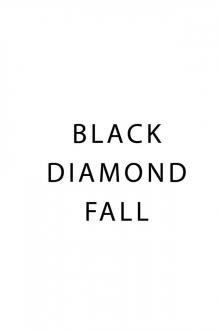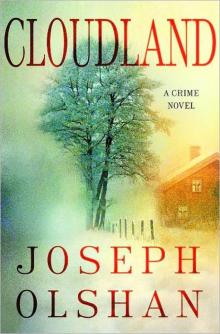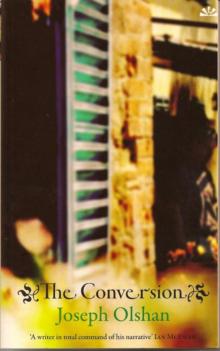- Home
- Joseph Olshan
Nightswimmer Page 7
Nightswimmer Read online
Page 7
Earlier in. the day, Bobby’s ex had managed to get through, and when you’d balked at his demands, he told you there were people he knew who wanted to ruin your face forever.
The horror of this idea stunned me for a moment and then I growled, “Not while I’m around.”
“Come on, Will, he couldn’t have been serious. He was just trying to scare me. And I certainly don’t need you to be my protector. I can deal with this on my own.”
“Now, wait a second, Sean. Just one second!” I stopped walking to emphasize what I had to say. “If somebody came up to us right now, am I supposed to just stand back? Let them hurt you?”
You laughed scornfully and faced the Hudson.
We continued to stand there in suppressed indignation, bracing ourselves against the wind. The moment passed, and when we started walking again, you turned to me, your eyes glistening.
“What would you do if I came up to you one day and my face was completely wrecked? Would you dump me then?”
“I didn’t even know I had you to get rid of.”
“Come on, you know what I’m saying. Let’s say you did have me … to get rid of.”
“How about this, Sean: I’d blind myself so I wouldn’t have to see what had been done to you.”
You threw your head back and howled with laughter. “Oh, God, so grandiose. So nineteenth-century.”
“Don’t knock the nineteenth century. Some great novels came out of the nineteenth century.”
“Yeah, and so did some bad operas,” you said.
SEVEN
YOUR APARTMENT WAS EVEN messier than it had been several days ago. The pile of clothing and magazines in the middle of the floor had continued to gather and there was a daunting collection of dirty dishes on the dining table. Yet there you sat wearing a crisp white T-shirt and those military shorts with a razor-sharp crease down the front. I noticed clusters of cut flowers everywhere: on the mantel white roses floated like lilies in a glass bowl; the violet faces of pansies draped over a short stubby vase, their thin stems bobbing on the surface of the water. All the flowers looked as if they’d come from a backyard, not from a store, a fact confirmed when I learned that you spent weekends tending a brownstone garden that you’d designed on Charles Street.
You retreated into the small dressing area, where there was a drafting table and a bulletin board filled with photographs of yourself with friends, a single hanging strand of pearls that once a drag queen had thrown around your neck; a chain dangling a rainbow assortment of freedom rings; a pair of blue undershorts that had belonged to an especially memorable sexual encounter. You removed a thumbtack from a snapshot and brought it over to me. “That’s Bobby Garzino.” I flinched, half-expecting to see an emaciated face, an ethereal portrait of someone fast leaving the world behind. But this turned out to be a photo of a healthy man, no doubt taken before your first acquaintance with him. I contemplated a goofily handsome man whose chin had an appealing spoil of cross-hatched acne scars, whose ears were a bit large, whose dark eyes were soulful and turbulent. In them it was easy to see the glint of a wounded past.
“He was a gifted man,” you explained. “He was a weaver.” I frowned. “You know, like weaving baskets and silk fabrics. All these woven things he made.” You led me to a closet near your front door where there was a small, square wall hanging composed of threads of varying thicknesses that were woven in a Hopi-like design. “That Egyptian-looking basket on the hearth, the one made of sixteen-millimeter film? That’s his work. I’ve got scarves made out of nubby silk. A couple of lamb’s-wool sweaters. Anyway, Bobby had his own custom-weaving business. He called it ‘The Loom’s Desire.’ ”
It was now hard for me to look at the photograph, which I still held. Almost like looking at a photograph of myself after you’d told me that I could never be your lover.
“He has—had—two looms in his apartment. They took up most of the main room. He could spend hours weaving the most amazing things.” You frowned and then shrugged. “Probably why his old lover wants it all back. Anyway, I used to hang out with him while he worked and do some of my own drawings. He would go into a kind of trance. Almost like he was playing a silent harp.”
The last time you’d seen Bobby Garzino was when he showed up at your apartment unannounced late one night in February in the middle of a severe snowstorm. You’d been out of touch with him for over two months, although somebody had been calling you at home and at work, hanging up as soon as your voice could be heard on the line.
You faltered for a moment. “He did the wildest thing, Will. He sat down in the middle of this floor, in that pile, although it was a different pile then, and he told me … he told me that this apartment was the most beautiful place he’d ever been to in his entire life. He said it was like being at a shrine.”
I know exactly what he means, I thought, as I looked at the wings of the butterflies, veins of exotic deep pastels that would be impossible to re-create on any palette, the likes of which I’d seen only in tropical fish. And from across the room, the iridescence of the wood ducks’ heads.
You continued, “He told me that since we’d ended it he’d been unable to take up his loom. That he’d just sit there and stare at it. And that the only place he thought he could do his weaving was here.”
“You mean, he wanted to bring his loom over?”
“When I told him he really couldn’t do that, he broke down and just lay there in the middle of my clothes. He kept telling me that I’d done something to him that made him feel stuck like…‘like a needle of a throttle’ was the way he put it.”
“But then you made love to him?”
“Yes.”
“But why, if you knew it would only make his misery worse? It would only give him false hope.”
You looked tormented and then made a fist and banged it on your chest. “Maybe I didn’t realize that yet, okay? Maybe I thought he was finally going to get through to me.” You paused and scowled at me, breathing swiftly. “When he came over here that night and put himself on the line, I really admired him for that and I thought maybe I’d … I don’t know!” you cried out. “I don’t fucking know.”
And then I was all over you. Couldn’t wait any longer, I just had to kiss that soft bud of a mouth. And as you resisted me I remembered California, afternoons of argument that he and I spent in my apartment, foolish arguments, in retrospect, urged on by the fact that one of us was in the mood for sex and the other was not. When chemistry is great between two guys as it was with him, it can bond in a way nothing else can. And yet I’ve come to believe that great chemistry is, more often than not, paid for by some equally great antagonism that has yet to be discovered, and once discovered, then mastered, and that, in all its mystery, galvanizes attraction.
I remember how he and I would argue until we’d finally reach a stalemate and, falling into silence, he would peer sullenly out my window at the pastel waterfront buildings and the rows of king palm trees that lined Cabrillo Boulevard. But then smelling his sweat-with-chlorine-and-eucalyptus, I thought I’d crack if one of us didn’t break the barrier and initiate sex.
But with you it was different because you made clear from the beginning what ailed each of us. And there wasn’t a mystery that needed to be unraveled as much as there was a history that needed to be revealed.
You gently extricated yourself from my embrace. “I don’t know if I can do this right now, Will. I’m upset. Do you understand?”
“All too well.”
“I mean, when I first met this guy, he was completely self-sufficient. He was joyful, he loved his work. And his stuff was beautiful, too. He had tons of commissions lined up: wall hangings, designing fabric for custom-made clothing. But then after a few months with me he was completely miserable.”
“Sometimes I think that some of my loneliest times were when I’ve been involved,” I said.
“You mean with the guy whom you haven’t talked about?”
I hesitated. “I guess … wit
h him, yeah.”
“The guy whose name you won’t even tell me.”
“That’s because I don’t allow him to have one … Anymore,” I added after a moment.
“Come on, Will, you make it sound so melodramatic. Like you’re still so devastated ten years later that you can’t even speak his name.”
I glared at you, then realized how deftly you had changed the subject. I said matter-of-factly, “I can easily speak his name. It’s a rather uncommon name.” I found myself looking at the arcing neck of your trout fishing rod, at a pale blue oxford shirt hastily draped over a hanger that dangled from a closet doorknob. “But if you really want to know, I’ll tell you what it is. His name”—I hesitated—“is Chad.”
A short silence followed and then we heard a warbling sound, a soft clamoring of wings, as though, just by mentioning him, I’d roused a nest of pigeons from the building eaves.
“So what bugs you so much to say his name?”
“What bugs me is that I’m still angry.” You frowned and then I added, “I don’t say his name because I don’t know if he died or if he left me. I don’t say his name because if he left me, it’s my only way of … I don’t know, Sean, it’s been a lot worse living with the idea that he might have wanted to disappear.”
“But what exactly happened to him?”
I gulped and couldn’t answer at first, couldn’t get the words to come. Had to wait for them, still afraid to admit why it had been so hard for all this time.
“You see, we became … we were nightswimmers,” I finally began. “But it was his thing. He coerced me into swimming after dark in the ocean because he loved doing it. He was magnificent in the water, completely fearless. He was the only guy I ever knew who could do a thousand yards straight of butterfly.”
I described that last swim and the sudden appearance of the barge coming toward us. How I thought we were turning around and swimming in together, but it ended up being only me.
You waited a few moments and then you said, “So what are you telling me? That he never came out?”
I explained how I’d waited for him by the two-hundred-yard buoys for what seemed like hours, how I’d ended up with a bad case of hypothermia.
“So then he must’ve drowned—like Leander drowned crossing the Hellespont.”
I sighed. “We were close enough to shore that … let’s put it this way, usually things as large as human bodies wash up fairly soon.”
“Usually. Unless a shark got to him first.”
A fate that I’d imagined hundreds of times. “Still, there’d be—almost always there’s some trace or other that washes up: bones, parts. I talked to the Coast Guard many times. But they found nothing whatsoever.”
“But there was that boat?”
I faltered and then continued with difficulty.
“Even if he’d gotten sucked into the propeller, there would have been some evidence. It was actually the Coast Guard who suggested to me he might have swum somewhere else and just walked away. In fact, I think that’s what they came to believe—though it wasn’t official.”
“But why? Why on earth would he do that?”
“I don’t have a clue. I only knew him for eight months.”
“What about his parents, what did they say?”
“That he just wasn’t the kind of guy to vanish. But then again, what would parents say?”
“And you really loved him, didn’t you?”
I lowered my eyes and nodded.
“And you really don’t think he’s dead?”
I now looked at you until I felt my glance piercing through. “I feel certain that he’s not dead. And knowing that, knowing that he’s probably alive right now, almost makes it worse.”
“I don’t agree. I think it’s easier for you to believe that he’s alive.”
That made me angry. “I knew you wouldn’t get it if I told you!” Again, I explained there would’ve been some trace, and how I’d done research into similar situations and learned that there were many people who did exactly that, “lost” themselves and were finally tracked down years later. “If you could’ve seen the way he swam, you would’ve understood there was no way he could’ve drowned. He used to go surfing in all kinds of weather and come out without a scratch. He used to go swimming in rough water when nobody else would.”
“He sounds like one of those people who love to tempt the edge. But sometimes those sorts of people lose their gamble.”
“He was a survivor from the word go. There was plenty of warning that the barge was coming. He obviously wanted to escape. And I’ll just never know why.”
You slipped your arms around me and held my head against your shoulder and stroked the back of my neck. And after a stint of silence you said, “You’re too wonderful a man for anybody to want to leave you without at least an explanation.”
Taking this as a signal, I drew a tongue line down your neck, and kissed arcs along your shoulders and gave you a small strategic bite that elicited a shudder, and only then did you begin to respond. Fixing mournful eyes on me, you sat up and took your shirt off with a deft, languorous motion. Pale, unblemished skin and muscles defined but not unnaturally chiseled. Gravity was just beginning to take its toll on you, but you didn’t seem to care. You were one of the few men I knew with an attractive body who did not feel the need to wear clothing to show off what you had. That was probably because you’d had it your whole life, and in the healthiest way took it for granted.
We both stood up and now I stripped off my shirt. Hands on my waist, you bent down and took one of my nipples in your mouth, gave it slight pressure with your teeth, then flicked your tongue at it. Lifted me and squeezed my back until it cracked, then carried me over to your bed, threw me down and jumped on top of me.
I often think of that first night when I told you about Chad; of all your weight on top of me, and myself pressed to your bed, hands pinned to either side of my ears, of how I pushed until I raised you above me and we formed this cage of arms before I lowered you into a kiss. I think about how your back widened dramatically, just as his did, but how your legs were much larger and as hard as a wall. And I think about how long it took you to warm up to kissing me, how you seemed afraid that my tongue would begin an invasion that might end up with my capturing yet another piece of you.
But when you finally gave in to those longer sensual kisses, the potency of each one was somehow a token history of your loneliness. It was then that I began to believe that we could be at par with one another. It was then that I felt a small warmth ignite in the core of myself, the place I had been afraid no one would ever reach again.
Then you stopped abruptly and turned your head away, and I could see a tear pressing out of the corner of your eyes. Your body convulsed in a single sob before you huddled into yourself. I was about to ask what was wrong when the phone jump-started our nerves. We listened to the machine pick up a boisterous message: that of a restaurant, dishes clacking, detonations of laughter, blares of jazz. No one spoke.
I suddenly remembered that I, too, had received a similar anonymous phone call. I asked if you’d received other calls like this.
You hurriedly wiped your eyes and said that you had.
“Because I got one myself. This morning.”
“Probably just a coincidence. This ex-lover doesn’t know we know each other.”
Moments passed and we lay there without speaking.
“I think you do bring him out in me, somehow,” I found myself saying.
You turned to me with a wet cheek. “What exactly do you mean?”
“Right off the bat? Something about your eyes.” I hesitated and then I asked, “Do I at all remind you of … Bobby Garzino?”
You faced the ceiling again and smiled your silly smile. “Nah. You’re very different from Bobby Garzino.”
“In what way?”
“You’re much more self-confident. Outgoing. He was rather quiet. Tentative. Incredibly intense. I think he was actually to
o fragile to live long in this world.”
I let this idea creep through me for a moment. “Do you feel guilty about his dying?”
“It was his choice, wasn’t it? Why, would you feel guilty?”
It struck me then that there are certain people who feel their vitality is enhanced when they help a person who is dying. Others feel their lives will be sucked away even if they so much as identify with somebody who is ill. “I think I would in some way,” I remarked. “I mean, especially if I’d been the last person he’d been involved with before he got sick.” I waited a moment and then I said, “Do I know everything, Sean?”
“What do you mean by ‘everything’?”
“Is there something, anything, you’re leaving out?” I still could not shake the idea there was a secret you held on to.
You suddenly grew impatient with me. When you spoke again, it was in a fierce whisper. And for some reason I didn’t quite realize you never answered my question. “Look, Will, I told him that I’d been hurt badly before. That I’d never gotten over it.”
Now it’s clear to me that your answer was only a defense, the type of ploy a hardened seducer uses when he refers to a wife and kids whom he can never abandon.
“Was it really so bad?” I asked. “You’ve never really told me about what happened before Bobby.”
“I don’t create novels of my past. And I didn’t tell Bobby much, either, because I never needed to. I wasn’t in love with Bobby Garzino. And he knew it.”
I reflected on this for a moment. “But you’re going to tell me what happened to you, yes?” I’d wanted to add, “And you’re not in love with me, are you?”
You fixed me with a spooky gaze and then, interlacing our hands, said, “Don’t you see why? Because I think we’re going to be able to help each other.”
“But you once said it was going to be a ‘tough tournament.’ ”
“I’ve gotten to know you a little bit more. I’ve changed my mind.”
A chaotic chorus of late night voices passed below your window, and out of them we were able to distinguish a man singing “Wild Horses” by the Rolling Stones.

 Black Diamond Fall
Black Diamond Fall Cloudland
Cloudland Nightswimmer
Nightswimmer The Conversion
The Conversion